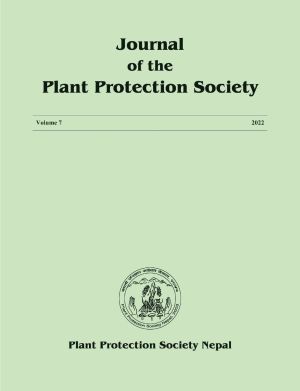Asian Citrus Psyllid Diaphorina citri (Kuwayama) (Hemiptera: Liviidae) and its Detection Survey in Citrus Orchards of Sindhuli, Nepal
DOI:
https://doi.org/10.3126/jpps.v7i01.47298Keywords:
Asian citrus psyllid, citrus, citrus greening, fastidious, vector insectAbstract
Citrus greening, also known as Huanglongbing (HLB), is one of the world's most devastating citrus diseases. In Asia, including Nepal, the disease is vectored by Asian citrus psyllid (Diaphorina citri (Kuwayama)) that transmits the pathogen Candidatus Liberibacter asiaticus, which is a fastidious, phloem-limited bacterium. Recently, the Sindhuli district of Nepal, well-known for sweet orange production, has been suspected of this destructive disease. Therefore, a detection survey on the vector was conducted by Plant Quarantine and Pesticide Management Centre, Lalitpur, in coordination with Prime Minister Agriculture Modernization Project, Project Implementation Unit, Sindhuli, during the second week of April 2021. The survey carried out on six major citrus growing pockets in the Sindhuli district revealed the presence of D. citri in the citrus orchards of Golanjor rural municipality ward no. 3, Sindhuli. Also, it was found that 2.96 percent and 20 percent of the surveyed citrus orchards of Sindhuli and Golanjor-3 were infested by D. citri, respectively. The existence of the vector in the orchards has increased the chances of citrus greening occurrence; however, tests like Polymerase Chain Reaction (PCR) can be helpful for the further confirmation of the disease in the region. In addition, the government should organize campaigns to make the citrus growers familiar with its vector insect-citrus psyllid, HLB, and its preventive and curative management measures as soon as possible to minimize the losses from the disease.
Downloads
Downloads
Published
How to Cite
Issue
Section
License

This work is licensed under a Creative Commons Attribution-NonCommercial 4.0 International License.
This license enables reusers to distribute, remix, adapt, and build upon the material in any medium or format for noncommercial purposes only, and only so long as attribution is given to the creator.

